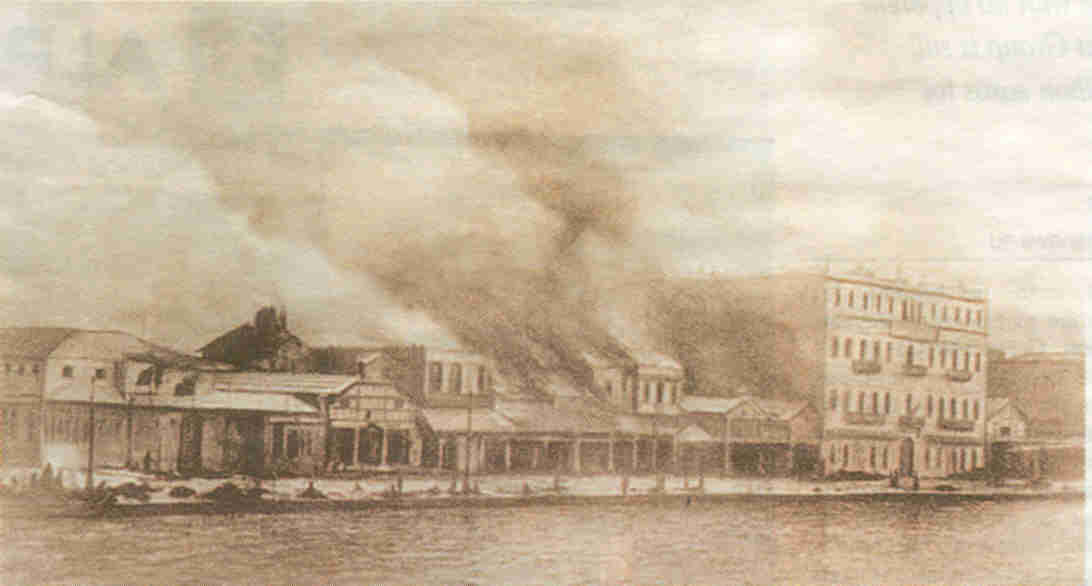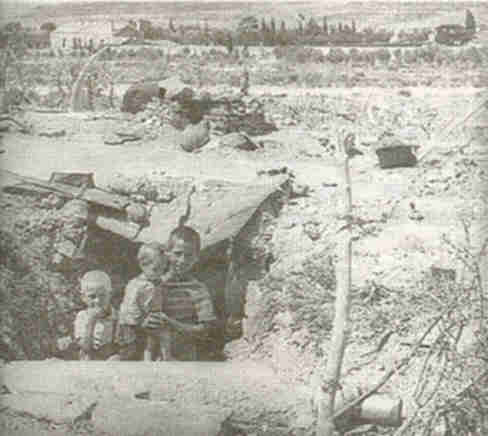 |
||
|
History Through Song: The Impact of Rembetika Music |
||
|
In our first look at rembetika, we see how the early history and the lyric of the song intertwine By Stephen Brothwell As a condition of Greece's entry into the First World War and as the prize for such involvement, Greek troops were allowed to occupy the primarily Orthodox Christian city of Smyrna and its environs on the Mediterranean coast of Turkey. However, the Greek troops lacked support from the Allies and, in 1921, the Turkish army attacked the city of Smyrna and set it ablaze. Unable to defeat the invading forces of Ataturk, the Greek army was forced to relinquish the city. |
 Smyrna in flames |
|
|
It was under these conditions, soon to be dubbed by the Greeks as the Asia Minor Catastrophe, Greece was forced to accept the terms of the population exchanges of the Treaty of Lausanne. Signed in July 1923, the treaty stated that "there shall take place a compulsory exchange of Turkish nationals of the Greek Orthodox religion established in Turkish territory". Essentially, it was this migration that forced rembetika music--a form of Ottoman music that had reached Greece some time before the 1920s but only became popular with he arrival of the refugees. These refugees steadily arrived in Greece proper and their incorporation into Greek society in the interwar period changed the musical life of Greece forever. A song of sorrow The consequences of the new peace terms were considerable - the conservative records of the 1928 Greek census show that the population immediately increased by 1,221,849. Even accounting for the far smaller number of Muslims forced to leave Greece far higher than in its neighboring countries. Through its lyrics and musical style, rembetika - which has its own tradition of metre and linguistic style typical to the Near East and Smyrna - served to reflect the changing status of the dispossessed. In imposing itself upon Greece, it impacted everyone. Just two decades on, it was able to symbolize the spirit of Greek resistance during the Second World War. In the late 19th century and the early decades of the 20th century - the period of rembetika's development - it was typical for lyrics to be entirely improvised within the strict Ottoman metre of a 15-syllable line, and they were never recorded or preserved. With the advent of mass recording in the 1920s, particularly famous songs developed a legacy independent of their lyrics. However, broadly speaking, rembetika songs retained an improvisional edge. Today, they provide insight into the period from which they emerged. An example of the improvisional lyrics persisting well into the refugee period, as well the endurance of the Ottoman15-syllable line, can be seen by the strict metre of "If I Die on the Boat" (anonymous, c1925), kept to with shouts of the superfluous 'aman'. "If I die, what will they say of me? Some youngster died, a handsome man died who had a lust for life. Aman! Aman! If I die on a boat, throw me in the sea, the black fish and salt water can eat me. Aman! Aman!" This song also gives an indication of the linguistic style and narrative used in the lyrics, far removed from high culture with their rough vocabulary drawn heavily from Turkish idioms and drug-related slang. Importantly, the lyrics are convoluted and never extrovertly state anything, particularly political positions. Instead, the listener is forced to interpret and engage with the emotion of the song. This is apparent in "Why I Smoke Cocaine" by Rosa Eskenazi (1932). Outcast We can assume that the audience listened to and empathized with the lyrics of the songs from the attempts to censor them in the 1930s. On 4 August 1936. General Metaxas, an autocrat whose rule from 1936 to 1941 quieted the constitutional debacle that was to characterize much of post-Great War Greece, censored any reference to the underworld and drugs in rembetika music. |
||
| This theme had been central to the music. That is was banned demonstrates not only the social significance of rembetika by the 1930s, but also gives an indication of the social life of the refugees. The initial poverty of this group is unquestionable - in 1929 John Simpson, reporting to the Greek refugee settlement commission, said that only 200,000 refugees were able to support themselves on arriving in Greece. The Athens News spoke to 85-year-old Costas Markopoulos, a resident of Thessaloniki. Both his parents were Christians from the northwest of modern Turkey, and their experiences were typical of all those who became refugees in the aftermath of the Smyrna events. "At the time when they left from Smyrna, my mother told me that all the people of her village were scattered across all the villages of Greece and lived as destitute refugees," he said. |
 Refugee children pictured in front of their humble housing |
|
|
"It was heartbreaking," he continued. "If you had lost property in Anatolia, the government gave you something - if you had nothing to lose, like my parents, you got nothing from the government. The suffering was terrible."
In cultural and economic terms, the mass of immigrants had more in common with the established underworld than mainstream Greek society. For example, hashish smoking was not considered extraordinary or anti-social in the former Ottoman Empire as it was in Greece. In particular, the phenomenon of the Greek underworld accommodating the refugees in their poverty can be seen in Piraeus, where it was the refugees who swelled the hashish smoking population and who built and ran the drug and gambling dens of the Karaiskaki district. It is unsurprising that the underworld and drug songs formed the basic theme of early rembetika, along with eroticism, given the intrinsic link between the music and the living circumstances of the refugee population in Greece. It is interesting to note that when Metaxas censored the music, he also ordered the demolition of the Karaiskaki district. |
||
(Posting date 16 January 2009)
All articles of Athens News appearing on HCS have been reprinted with permission. |
||
|
||
|
2000 © Hellenic Communication Service, L.L.C. All Rights Reserved.
http://www.HellenicComServe.com |
||

